Tooth extraction is a stressful situationeven if the operation is performed under the influence of painkillers.
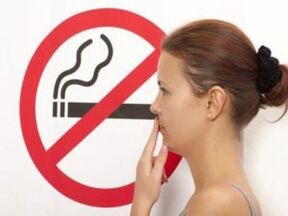
And heavy smokersafter the emotions experienced, for sure, will get a cigarette, thus trying to relax a little.
This is the way they think to relieve the pain that usually starts to increase when the anesthetic disappears.
And this should not be done.Below in this article we will discuss the question of whether it is possible to smoke after tooth extraction and why it is strictly forbidden to do this immediately after the procedure? We will provide recommendations for various cases.
Effects of cigarette smoke and nicotine on recovery after tooth extraction
Keep in mind!The composition of cigarette smoke contains large amounts of chemicals and compounds that are harmful to the body as a whole and, at the same time, inhibit the wound healing process.
Nicotine is a strong irritant on the side of the socket left after surgery.
It blocks blood vessels that carry blood to the wound.
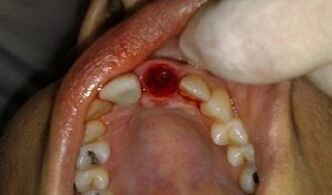
The longer and more violent tobacco acts on a wound, the longer it takes to heal.
Smoking also has a negative effect on the blood clotting process.
As a result, the wound remains open for a long time, continues to bleed, as a result of which the risk of infection with various infections increases several times.
Inflammation is the result of an infection in the wound cavity.
Symptoms and signs: general disorder, headache, fever, redness of the gums, acute pain in them.
How long does smoking prohibit?
Note!Dentists recommend observing a minimum smoking cessation period after tooth extraction - 2 - 3 hours.
After this time, you can smoke, but only if the bleeding has stopped completely.
When can I smoke after removing teeth?
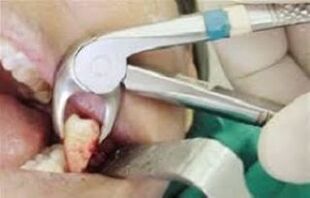
Getting wisdom teeth (picture eight) is a long and difficult process.
These teeth are characterized by broad, growing roots, often curved, that sometimes have to be removed in sections.
Extensive lesions remain in the gums after such an operation,where dentists often sew and remove.
Also, doctors often prescribe antibiotics to prevent inflammation.
Follow the information!While leaving the medical office, smokers should consult a dentist about when to smoke first and start eating.
The doctor's answer directly will depend on the patient's health condition, the course of the operation, etc. As a rule, all proposals are purely individual.
How long must I smoke after stitching?
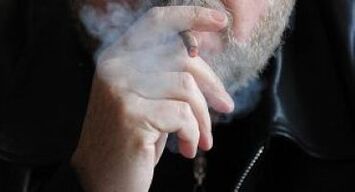
If, after the extraction, the doctor sews, he may recommend to make the first suction no earlier than 2 - 10 days.
This time is required for complete wound healing and reabsorption of postoperative sutures.
Failure to comply with recommended smoking cessation, postoperative complications may arise.
Even a cigarette can slow down wound healing.
How long can I smoke?The ideal choice is not to return to addiction for 2 to 10 days.
Hookah and e-cigarettes
Hookah, like electronic cigarettes (vaping), is contraindicated in patients at least 3 hours after surgery. Heated smoke or vapors irritate soft tissues and can cause recurrent bleeding.
What consequences can you face?
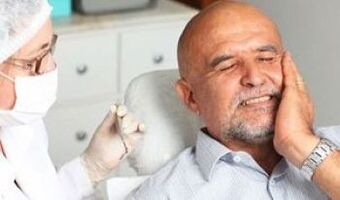
Each patient has the right to decide independently whether to smoke or not. But before taking the first breath, it is recommended for every smoker to know the possible consequences if the dentist's recommendations are not followed.
A large number of them can cause serious health problems, and some can be fatal.
There are 3 very dangerous complications for smokers:
- Osteomyelitis.
Purulent inflammation of bone tissue due to infection. The disease is very serious and, if not treated properly, can lead to patient death. - Osteitis alveolar(dry socket).
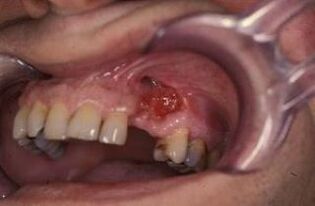 Conditions when there are no blood clots in the fossa, which is a natural barrier to infection entering the hole. Blood clots can "come out" under the influence of nicotine, which is its ability to increase blood pressure in the blood vessels.
Conditions when there are no blood clots in the fossa, which is a natural barrier to infection entering the hole. Blood clots can "come out" under the influence of nicotine, which is its ability to increase blood pressure in the blood vessels. - Alveolitis.
Inflammation of nearby tooth sockets and tissues after removal. The area of the hole begins to ache a lot, swells and is covered with a gray layer, the patient's temperature rises, the submandibular lymph nodes increase, food intake is not possible due to acute pain.
What else is not recommended?
Need to know!After a tooth extraction, some recommendations should be followed:
- Brush your teeth, rinse your mouth for 24 hoursafter surgery. Such an event can trigger a "cleansing" of blood clots.
- Hot showers, bath halls, saunas.High temperatures can cause increased stress and, as a result, new bleeding.
- Fit yourself physically.Exercise can also trigger hypertension.
- Drinking alcoholI am another factor that can cause high blood pressure and, consequently, bleeding from wounds.
- Eat fastafter extraction: it is better to wait 2-3 hours.
- Do not allow dishes to become hot, cold, which can injure the oral cavity. It is better to stay away from spicy foods. Do not open your mouth wide after sewing: muscle tension can cause discrepancies.
- It is better not to drive,because painkillers used during extraction can make you drowsy.

Important! After tooth extraction, patients can apply ice to the cheeks to relieve pain, taking painkillers recommended by a doctor (except aspirin).
No earlier than 20 minutes, you can remove an antiseptic soaked tampon, provided the bleeding has stopped completely.
If the tampon stays on the wound for a long time, it can be an ideal breeding ground for bacteria.
Read also the article that will help study this problem in more detail,which will make prevention faster and better:
- how to get rid of cigarette smoke from the mouth;
- toothpaste for smokers;
- language and smoking;
- smoking plaque on teeth.
Comments
Here are some reviews. If you have something to say - leave your feedback in the comments below the article, this will be useful for our readers.
I am tormented by the teeth of wisdom: I am always in pain, begin to fall. My dentist recommends removing it as the only option.
I agree right away: I'm tired of taking painkillers. The operation went well, but the stitches still needed to be sewn.
But what surprised me when the doctor mentioned quitting smoking! And I am a heavy smoker, a cigarette can overcome itching, anger, and even pain.
Why do I have to stop the obstacles after leaving the hospital! But the will happened. The result is a successful healing process.
My teeth are pulled out. The doctor, who gave postoperative recommendations, drew my attention to the fact that it is better not to smoke for 2-3 hours.
I could not hold back even for half an hour - I lit a cigarette: the blood started coming out of the wound immediately and did not stop.
I had to see a doctor again for help. It was nice of me to go back to the hospital, because it could all end up even sadder.
Dentists say that there is a high risk of infection in the wound due to the fact that nicotine eats it at the end and does not let it tighten.
Herbal infusion bath can alleviate the patient's condition and speed up the healing process.
A packet of chamomile is poured with boiling water, put in for half an hour and cooled to room temperature. The infusion should be put in the mouth and kept for about two minutes without rinsing.
No matter how strong your addiction to smoking is, you still have to use common sense.
The right and proper step is to follow all the doctor's recommendations.
Otherwise, the default patient should pay too high a price for non-compliance - the price of his own health. Is nicotine puff worth it?























